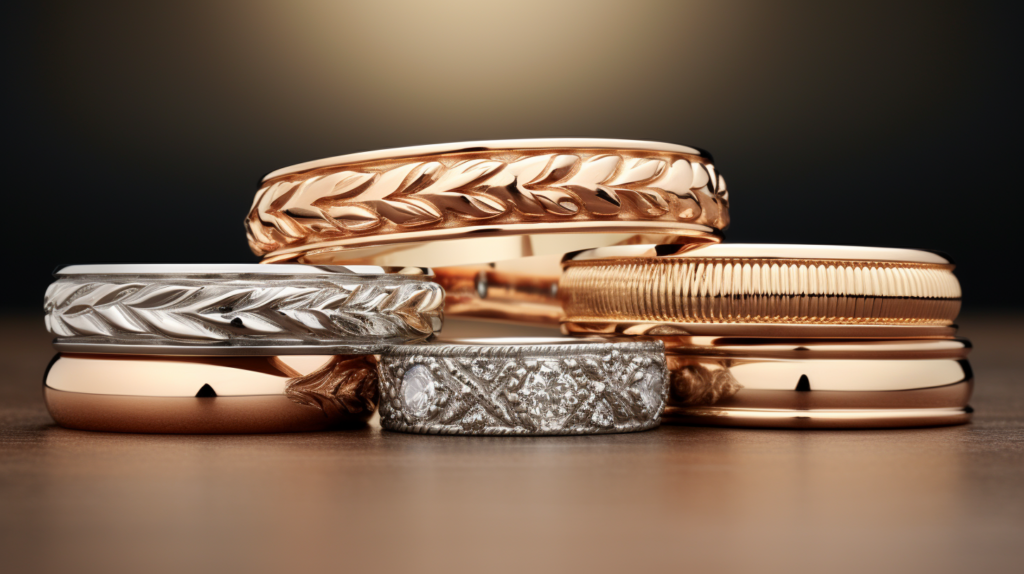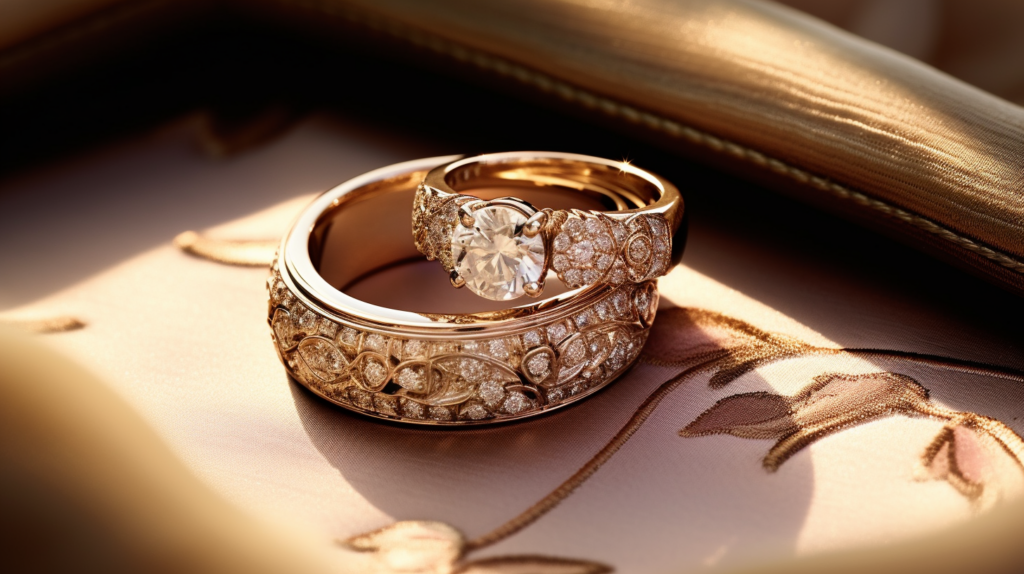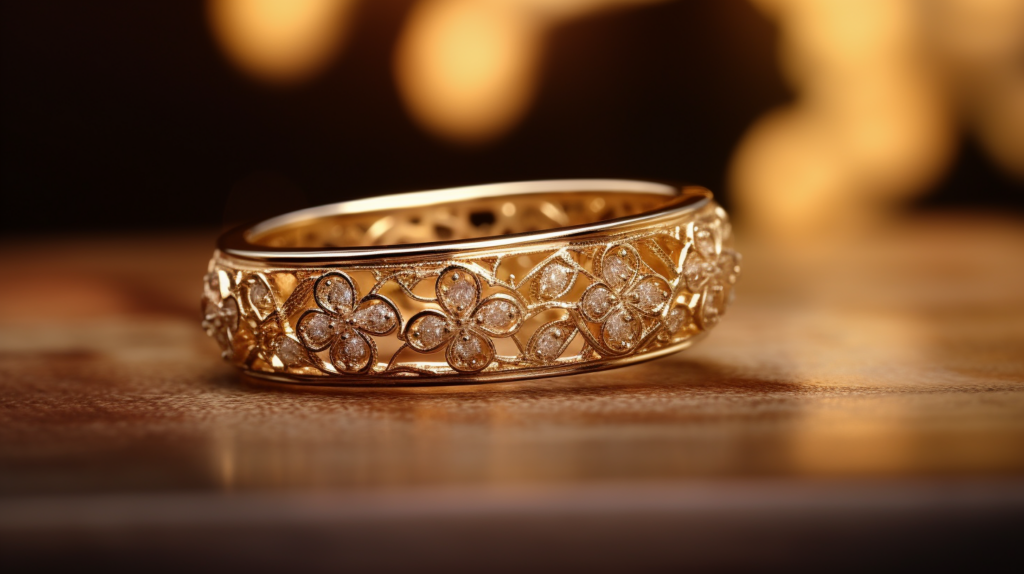We get it. Picking the best metals for wedding rings is like choosing a Netflix series – you want something that you’re not going to get tired of halfway through. Luckily, we’ve got your back with this invaluable guide that dives into the intricate world of wedding ring metals.
From the evergreen charm of gold to the robustness of titanium, we’re here to help you navigate these shiny waters.
Let’s cut to the chase and find that metal that makes your heart sing with BrighterGuide.
Key Takeaways
- Choosing the right metal for a wedding ring involves considering factors like durability, maintenance, and personal style, with popular options ranging from gold and platinum to titanium and tungsten.
- Different metals offer varied benefits; for instance, platinum is strong and durable, gold is traditional and timeless, while titanium is lightweight and hypoallergenic.
- Proper care is essential for maintaining the shine and longevity of wedding rings, and the level of upkeep varies depending on the chosen metal.

An introduction to the best metals for wedding rings
When it comes to settling on the ultimate metal for your wedding ring, you have to juggle aspects like durability, upkeep, and of course, how much it jazzes with your style. There’s a smorgasbord of options, each singing its own unique tune. Let’s hit the high notes, shall we?
White gold reigns as a crowd-favorite for wedding bands. It radiates an enduring and refined appearance, echoing the vibe of platinum but without the hefty price tag. Just a heads-up, white gold may call for occasional rhodium plating to keep its sparkle intact.
If you’re scouting for a metal that’s built to last, give platinum a gander. Known for its rarity and unparalleled strength, platinum is ideal for clutching those precious gems securely. Bonus points for its long-lasting shine and simple upkeep.
On the flip side, if you’re working within a budget, metals like titanium and tungsten are strong contenders. Titanium bands boast remarkable strength yet are light as a feather. Tungsten rings bring a good balance of weight and durability, and they hold their shine longer than a Broadway marquee.
Got sensitive skin? Say hello to hypoallergenic metals like platinum and cobalt. These gentle giants are less likely to give you a rash or turn you green.

How to choose the best type of ring for your wedding
Alright, before you put a ring on it, let’s weigh in on four key factors that’ll ensure your ring isn’t just another piece of bling but an everlasting emblem of your love:
- Material: There’s no shortage of metal types in the wedding ring market. Whether you’re drawn to traditional gold bands or quirky options like tungsten carbide and titanium, different materials bring their own set of pros and cons to the table. Durability, allergy-friendliness, and maintenance demands should be on your checklist when making your pick.
- Style: Wedding bands sport a dizzying array of designs, from old-school classics to chic modern marvels. Your style is your signature; make sure your ring is in sync with it.
- Symbolism: Rings are more than metal and stones; they’re the epitome of unity and eternal love. Factor in the symbolism of different metals and designs to find the ring that resonates with your love story.
- Upkeep: Platinum and palladium score brownie points for their ability to repel tarnish. In contrast, silver will need a bit of elbow grease to keep its sparkle. Think about how much TLC you’re willing to give your ring before making the commitment.

The best metals for wedding rings
We’ve got a plethora of options when it comes to wedding ring metals, each one with its own flair and features.
Gold
Gold, the Beyoncé of metals, is a time-honored choice for wedding bands. This shiny superstar has a few key attributes:
- Gold’s Color Palette: While yellow gold enjoys timeless status, white gold is making waves for its contemporary aesthetics. Both are alloy blends but white gold usually gets a rhodium polish for that extra glitz.
- Gold’s Karat Conundrum: Rings with higher gold content (like 24k) are softer, making them prone to wear and tear. However, lower karat golds such as 14k or 18k have more durability, making them a solid bet for everyday wear.
- Gold’s Price Watch: Gold’s value isn’t static. It’s prudent to keep an eye on the market to ensure you’re not paying an arm and a leg.
- Green Gold’s Debut: For those wanting to take the road less traveled, green gold, made with a mixture of gold and other metals like silver or copper, offers a quirky option.
The 14k vs 18k Gold Showdown
Let’s clear the air around 14k and 18k gold because, trust us, the distinction matters.
14k gold is 58.3% pure, and 18k gold sits at 75% purity. If you’re into metaphors, think of 18k as whole milk and 14k as skim. Higher karats mean softer gold, making it less suitable for everyday knocks and bumps, whereas 14k is your go-to for resilience and longevity.
Rose Gold
Rose gold, the Instagram darling of metals, has been capturing hearts left and right. Why? Here’s the scoop:
- Modern yet Timeless: Rose gold is the new kid on the block, yet it has an ageless charm that’s undeniable.
- Durability: The copper alloy in rose gold makes it tough as nails, making it perfect for those with an active lifestyle.
- Affordability: Rose gold is often less pricey than other popular metals without sacrificing aesthetics or durability.
- Sensitive Skin-Friendly: Though not as hypoallergenic as platinum, rose gold is relatively friendly to sensitive skin.
Whether you choose the opulent allure of platinum, the enduring charisma of gold, or the modern marvels of titanium and tungsten, your wedding ring is the ultimate symbol of your love. Choose wisely, invest in something you won’t second-guess, and let that ring be your forever plus-one.

Other metals that are suitable for wedding rings
Aside from gold and rose gold, other metal types are suitable for your perfect wedding ring. Here they are:
Platinum
Platinum, often hailed as the king of metals, is a luminous, dense, and durable metal that sets the gold standard—no pun intended—for wedding bands. Renowned as one of the most precious metals in existence, platinum is a coveted choice for anyone seeking an enduring symbol of their love and commitment. With its natural scratch resistance, it’s particularly well-suited for folks who lead action-packed lives or engage in manual labor.
This white metal brings a contemporary flair to the table, offering a fresh alternative to the gold wedding bands that have adorned fingers for centuries. As a member of the exclusive platinum family, platinum brings with it a wealth of unique properties that elevate it from mere metal to a luxurious treasure.
In terms of metal options for wedding bands, you’d be hard-pressed to find a more valuable or luxurious pick. Platinum doesn’t just survive the ravages of time; it transcends them, epitomizing the enduring bond of matrimony.
Sterling Silver
Sterling silver, often the go-to budget-friendly alternative to platinum and gold, charms its way into the hearts of couples with its ethereal white sheen.
- This white-colored wonder is a quintessential pick for those striving for an aura of classic elegance without the platinum price tag.
- It’s true, sterling silver may not compete with the hardness of platinum or titanium, but it remains a tried-and-true choice in the realm of jewelry metals.
- A heads-up though: sterling silver contains a smidgen of copper content, which can play the villain for those with skin sensitivities or a history of allergic reactions.
- But let’s not throw the baby out with the bathwater. Sterling silver continues to be a prime pick for wedding bands, especially for those searching for a beautiful piece of jewelry that won’t break the bank.
Now, let’s pivot to a metal that’s winning over the gents left and right: titanium.
Titanium
Titanium, the Superman of metals—robust, yet lighter than a feather. This high-quality precious metal is catching the eye, especially among men, due to its dynamic blend of incredible strength and feather-like lightness.
- One of the strongest metals you can wrap around your finger, titanium is several times stronger and harder than most common metals used in wedding bands.
- It doesn’t just stop at strength. Titanium is remarkably scratch-resistant, making it perfect for those who are rough on their jewelry or engage in a lot of manual labor.
- A highlight of titanium is its biocompatibility, which virtually eliminates the risk of allergic reactions, a huge perk for those with sensitive skin.
- On the flip side, titanium is a bit of a challenge to resize, so take extra care to get the size just right from the get-go.
Whether you’re after the luxe allure of platinum, the affordable elegance of sterling silver, or the unbeatable strength of titanium, there’s a metal out there to suit every style, lifestyle, and, yes, even skin tone.
How to take care of your chosen wedding ring
So you’ve said your “I dos,” and now you’ve got a shiny new wedding band gracing your finger. Awesome. But hold up—this ain’t a wear-it-and-forget-it deal. Different types of metal require different care regimens. So whether you’ve opted for a popular choice like gold or something more on the alternative metals end of the spectrum, here’s how to make sure your ring is as lasting as your love.
The Care and Keeping of Yellow Gold Wedding Bands
Ah, gold—the classic metal for jewelry and a common choice for wedding rings. If you’re rocking a yellow gold wedding band, chances are it’s made of a mix of gold with copper and maybe some other alloy metals. This concoction gives it that signature yellow color but also makes it a softer metal. That’s right, folks, this one can scratch and tarnish if you’re not careful. So how do you prevent that? Keep it polished and maybe stash it in tarnish-preventive bags when not wearing it. Oh, and get it professionally polished from time to time.
A Buffet of Affordable Metals
Let’s face it, not everyone’s going for the gold. There’s a whole smorgasbord of affordable metals, like titanium rings and sterling silver bands, that are a perfect choice for those on a budget. The perk of these alternative metal rings is that they usually need less fuss. Titanium, for instance, is lighter in weight but packs a wallop in the durability department. Sterling silver? Well, it needs a little more TLC to avoid scratches, but it’s still a strong player. Just watch out for metal allergies and signs of wear like loose stones or thinning bands.
The Ironclad Choices: Platinum and Titanium Wedding Bands
If you’re looking for the superhero metals of wedding bands, look no further than platinum and titanium. These bad boys are durable metal options that laugh in the face of scratches. Platinum wedding bands are about as luxe as you can get—a precious metal that’s harder and times rarer than gold. Titanium? Well, it’s strong as an ox but as light as a feather. Ideal for those who don’t want to even know they’re wearing a ring.
The Not-So-Spendy But Still Pretty: Palladium and Sterling Silver
For those not keen on emptying their savings for a chunk of metal, Palladium and sterling silver are still fabulous options. They both offer that gorgeous silvery-white sheen. Sure, Palladium might show scratches a tad more easily than its pricier cousin, platinum, but it’s still a durable alternative. Sterling silver might be a softer metal, but a little elbow grease in the cleaning department can keep it looking good as new.
Pricing
Let’s not beat around the bush; your choice of wedding ring material is going to affect your wallet. Gold rings, platinum bands, and palladium usually come with a heftier price tag. On the flip side, titanium wedding bands and sterling silver offer a range of prices that won’t have you eating ramen for a year.
Conclusion
At the end of the aisle, it all boils down to what you value most. Are you looking for a durable wedding band that’ll withstand a lifetime of wear? Maybe platinum is your guy. Is daily wear without the constant upkeep more your speed? Titanium’s got you. Whatever you choose, remember that your ring is a symbol of your love. It’s worth the little extra effort to keep it looking its very best. Now, go forth and rock that bling!
Sources
BrighterGuide is dedicated to providing accurate and relevant information as you explore the wonderful world of diamonds and jewelry. To this end, our writers refer to primary information sources in building each article that appears on this website. These include, but are not limited to, published news articles, government portals, research papers, and more.
- Karat Gold – Understanding Gold Purity – 9K, 10K, 14K, 18K, 22K, 24K. (n.d.). Onecklace. https://www.onecklace.com/tips/karat-gold-understanding-gold-purity/
- How durable are titanium rings? (2022, August 13). Titanium Rings. https://www.titaniumrings.com/blogs/news/how-durable-are-titanium-rings